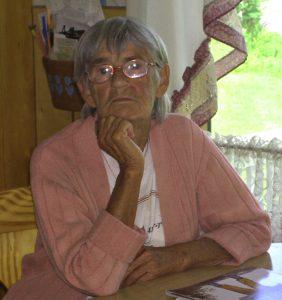Lela Anderson

The Last Sardine Cannery - Prospect Harbor, Maine
Through the middle of the 20th century there were as many as 75 canneries up and down the coast of Maine, providing employment and an abundant food source for Maine and the nation. That included feeding American troops through World War I and World War II. At the sound of the factory whistle, cannery workers came and packed fish, staying on the job until an entire boatload of fish was processed. By the 1970's the canneries we declining, and the last sardine cannery in the U.S., at Prospect Harbor, ME closed in April of 2010. Between 2011 and 2013, Keith Ludden interviewed over a dozen cannery workers who worked in the industry. These interviews can also be found on Oral History & Folklife Research's website - oralhistoryandfolklife.org.
Meghan Cociu
Keith Ludden
Lela Anderson, born on June 6, 1931, in Sullivan, Hancock County, worked at the Stinson Cannery from 1956 for 54 years. She grew up in Corea, Maine, and her mother had also worked at the cannery in the 1940s. Lela's family had a history of involvement with the cannery, as her mother, aunt, and older sister also worked there.
Scope and Content Note
The interview with Lela Anderson provides a firsthand account of her experiences and family's involvement with the Stinson Cannery, which later became the Bumble Bee Cannery and is now used for canning lobsters. Born on June 6, 1931, in Sullivan, Hancock County, Lela began working at the cannery in 1956 and continued for 54 years. Her mother had also worked at the cannery in the 1940s, and Lela's family had a history of involvement with the cannery, as her mother, aunt, and older sister also worked there. Lela's work at the cannery involved handling fish, and she mentioned that her job often left her dirty due to the nature of the work. The interview sheds light on the impact of the cannery on the local community, particularly the towns of Corea, Prospect Harbor, and Winter Harbor. Lela's insights provide valuable information about the economic and social dynamics of the area during the mid-20th century. Additionally, the interview touches on the employment of other families in the canneries, providing a glimpse into the broader community's involvement in the industry. Lela's account also offers a glimpse into the working conditions and the nature of the work involved in the canneries, providing valuable information about the labor practices and the experiences of workers during that era. The interview captures Lela's personal recollections of her time at the cannery, offering a unique perspective on the industrial and social history of the region. Overall, the interview with Lela Anderson provides a rich source of information about the Stinson Cannery, the Bumble Bee Cannery, and the canning industry's impact on the local community, as well as personal insights into the experiences of a long-time cannery worker.
Please Note: The oral histories in this collection are protected by copyright and have been created for educational, research and personal use as described by the Fair Use Doctrine in the U.S. Copyright law. Please reach out Voices@noaa.gov to let us know how these interviews are being used in your research, project, exhibit, etc. The Voices staff can help provide other useful resources related to your inquiry.
The NOAA mission is to understand and predict changes in climate, weather, oceans, and coasts, to share that knowledge and information with others, and to conserve and manage coastal and marine ecosystems and resources. The Voices Oral History Archives offers public access to a wide range of accounts, including historical materials that are products of their particular times, and may contain offensive language or negative stereotypes.
Voices Oral History Archives does not verify the accuracy of materials submitted to us. The opinions expressed in the interviews are those of the interviewee only. The interviews here have been made available to the public only after the interviewer has confirmed that they have obtained consent.
